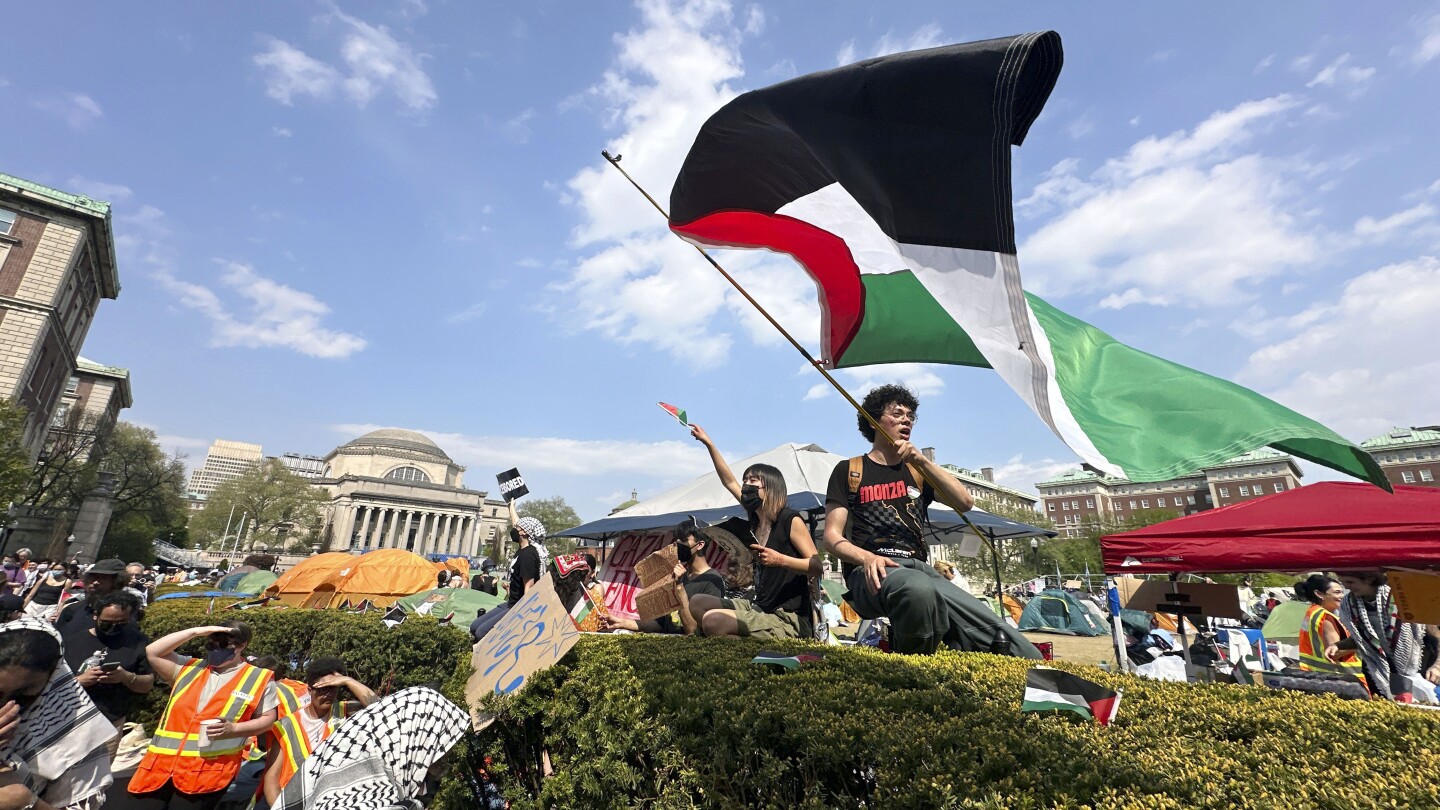As students return to college campuses across the United States, administrators are bracing for a resurgence in activism against the war in Gaza.
the us isnt looking like a democracy
Never has been.
🔫 👨🚀
Elsewhere on Lemmy I have been pilloried for being a free-speech absolutist, but I don’t think that most of these restrictions impede the free exchange of ideas (as opposed to deliberate disruption, which is not speech).
The University of Pennsylvania has outlined new “temporary guidelines” for student protests that include bans on encampments, overnight demonstrations, and the use of bullhorns and speakers until after 5 p.m. on class days. Penn also requires that posters and banners be removed within two weeks of going up. The university says it remains committed to freedom of speech and lawful assembly.
This seems entirely reasonable.
At Indiana University, protests after 11 p.m. are forbidden under a new “expressive activities policy” that took effect Aug 1. The policy says “camping” and erecting any type of shelter are prohibited on campus, and signs cannot be displayed on university property without prior approval.
This seems reasonable too. Note that the rule about signs applies only to attaching them to publicly-accessible university property. People are free to carry signs or display them in their dorms and on-campus offices.
The University of South Florida now requires approval for tents, canopies, banners, signs and amplifiers. The school’s “speech, expression and assembly” rules stipulate that no “activity,” including protests or demonstrations, is allowed after 5 p.m. on weekdays or during weekends and not allowed at all during the last two weeks of a semester.
I do disagree with this one. Allowing protests only on weekdays before 5:00 PM is not reasonable.
Protests don’t really work if they’re not disruptive.
The right to a free exchange of ideas includes the right to disagree with protestors without being harmed.
I don’t see how that has any relevance to the argument. Harming people is already illegal and isn’t being addressed here.
I am responding to this comment:
Protests don’t really work if they’re not disruptive.
I consider disruption to be a form of harm. It’s not as serious as, for example, physical injury, but it’s still harm. The main form of disruption that the recent protests have engaged in involved trespassing and so it was illegal, but many colleges preferred to address the problem internally rather than calling the police. These new rules are part of the process of addressing the problem internally, and we’re discussing whether or not they do so without infringing on the students’ free speech rights. My point is that preventing the protesters from being disruptive is not an infringement.
(“Illegal” wouldn’t be the end of the discussion even where the police were called to remove trespassers, because a university’s policy of having the police remove some trespassers but not others could also infringe on free speech rights.)
Disruption is not a form of harm.
Disruption is impossible without causing harm. If you’re not harming me then I can just ignore you and so you have failed to be disruptive.
Edit: The word “disruption” can be used in other contexts to describe acts that aren’t harmful. For example, a new discovery might be said to disrupt the existing paradigm. My claim is about “disruption” used to describe protest-associated actions like blocking roads, making a lot of noise, or preventing students from going to class.
Come now, I don’t believe for an instant that anyone is as fragile as that. Even my nephew who is a young cancer survivor and weathered people who refused to wear masks during the pandemic by wearing his own.
Protests don’t really work if they’re not disruptive.
At the same time, any legitimate authority has a vested interest in minimizing disruption.
It’s one of those things where I think neither side is inherently in the wrong, at least insofar as the question of “Protest vs. Disruption” is concerned. One must protest for what one believes is right, even if that protest must be disruptive to achieve its goals, and one must be prepared for a response from the authorities if that protest is sufficiently disruptive. You have to break rules, and you have to accept that the authorities are not necessarily wrong in trying to enforce the rules.
Short of saying “Only people I like are allowed to protest” or “Republicans can shut down the interstate highway indefinitely because they hate gay marriage”, neither of which are particularly appealing, I don’t really think that there’s another option.
That this is all done by universities in the defense of a genocidal apartheid state, though? Not very morally ambiguous. This isn’t a minor policy disagreement, or even a major one. This is support of corruption in US politics, the blatant sabotage of US interests abroad, and apartheid and genocide in Israel. Fuck these places trying to run interference for Israel.
The dynamic still holds as valid. It’s just that the universities are shitty fucking authorities for taking the side that many of them have.
I would be very interested in seeing any example of a case where minorly disruptive protest was successful at accomplishing its goal. Large scale disruption that paralyzes the flow of goods or services is one thing, like a strike for instance. But I think back to Occupy Wall St, and it was just absurd how poorly it all worked. Then on top of that, the expectations were so high that the failure set our movement for economic reform back instead of forward, by demoralizing the whole movement for years. It didn’t really recover until Bernie started running for President.
That was about as big and disruptive as you can go, too, and fresh off of a major economic fuck up that actually hurt many Americans.
It’s literally just a waste of energy, when people should be composing compelling arguments, compiling their evidence, and actually spreading it to new people via newsletters, flyers, pamphlets, conversations, speeches etc etc etc. Grassroots outreach.
Frankly I think that’s all too difficult though, and it’s easier for people to just pitch a tent somewhere and chant, even if it accomplishes nothing or even harm for your cause. It lets people feel like they’re helping, even if no strong evidence for the success of the method can be presented. Just theory.
Then on the flip side, you have BLM, which was able to actually create some change by getting some people elected through mass civic engagement. Some few places actually got some police reform, since the BLM protestors were mostly all peaceful and lawful, and you could sympathize with their cause. And there was a metric shitload of them, that always helps.
iirc, ows was infiltrated by business interests?
Let’s assume it absolutely was. Could it have gone better if we had done something differently?
At the end of the day, there was no mechanism for results. If the plan was:
- Get together
- Shut shit down
- ???
- profit
Then the ??? part wound up being “no solutions through this point”. That’s the problem. There is literally no step there, it’s a dead end that prevents you from ever advancing.
I can’t say for sure, but I thought the purpose was that the public would then take up the flight and begin boycotting and suing?
An idea, for sure. It never materialized, though. People didn’t seem eager to just jump up and drop their day-to-day stuff to join a movement, even after it had recently directly fucked them all over.
Protests are largely only effective if they’re disruptive. That’s kind of the point… a protest you can easily ignore isn’t going to change anything.
And the point isn’t really to gain support, it’s to force change.
Edit: To expand on this, there are much more effective ways to gain support; mainly through community interaction, conversation and education. Which should be seen as separate action vs. protesting.
Edit 2: Upon re-reading my comment I would like to amend my statement that the point is to force “change”. While change is the desired outcome, the point of protests is to force awareness.
I don’t necessarily disagree with you, but my objection is to the following argument that some people are making:
-
I have the right to protest.
-
My protest isn’t going to be effective unless I am disruptive.
-
Therefore, I have the right to be disruptive.
I’m saying that (3) doesn’t follow from (1) and (2). The right to speak does not imply the right to be heard and obeyed.
While I feel we mostly are in agreement, I have a problem with the verbiage you use. Specifically the idea that the desired outcome is to force the population at large to “obey” protesters.
While no one should be forced to “obey” a protest, the disruption itself is often necessary to make the issues visible and impossible to ignore. It’s not about the right to be heard and obeyed, but about ensuring that the issues at hand cannot be easily dismissed or overlooked. Disruption, when done with purpose, has historically been a critical tool for marginalized groups to bring about the changes that polite appeals often fail to achieve.
Yes, but the point is that being disruptive is often going against the rules. So, having rules to control when protests can happen is a bit of a misnomer.
The question is whether the punishment will match the crime. Protesting before 5pm, youre at risk of a $50 fine and an apology letter to the class you disrupted. Or, you will be kicked out of university costing you your chosen career and the amount you’ve paid thus far.
Protests should be disruptive. The university has to try and minimise the disruption to normal activity. At the same time, the univeraity shoukd want to foster free tjought and dissemination of ideas, peacefully, even if taboo or against current accepted norms of thought. The protestors need to disrupt normal activity. The protestors are also students that pay the university, so pay their bils. The university also has other educational, financial and hr responsibility. Its a balance for both.
While universities have a duty to maintain order and educate, they also have a responsibility to be spaces where free thought can challenge existing norms. Disruption, though uncomfortable, often serves as the catalyst for meaningful dialogue and progress. If protests were only allowed to occur within strict confines, they might lose their power to inspire the kind of reflection and change that has historically made educational institutions breeding grounds for progress.
Balancing the need for order with the need for protest is tricky, but history shows that sometimes, it’s the disruptions that push us all forward. In my opinion, those (often powerful) institutions should be tempering their response to these disruptions; rather than asking their student body to temper their actions.
There is no greater opportunity for the exploration and development of radical thought than by allowing students to be a part of that future history (should they choose to).
-
Revoking the right to question the war, that’s awesome. It’s cool to violate 1st Amendment rights when the good guys do it!
We’ve been violating the First Amendment for about as long as we’ve had it. Our other felon presidential candidate ran from jail after being imprisoned for speaking out about World War 1 (which is a lot cooler than what the current one did).






